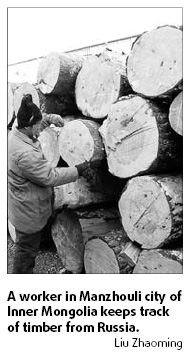System to ensure sustainability,legality of logging
In an effort to ease possible trade friction with the United States and the European Union, China is establishing a system to verify its timber products have been logged legally.
The pilot project is being tested with a group of companies and is working back through their supply chains to find out where the timber is harvested.
"China is determined to strengthen its domestic logging and to enhance the legality and sustainability of the wood trade," said Zhang Yanhong with the State Administration of Forestry.
|
|
Admitting that the process is very lengthy, Zhang said the new system, once established, will verify imports from China's major timber importing countries that include Russia, countries in Africa and Southeast Asia, as well as those in South America.
One-third of the timber is used to make furniture. Of all wood furniture exported in 2007, 47 percent headed to North America, 20 percent to Europe and 24 percent to other countries in Asia.
By summer 2011 when the project is complete, recommendations will be made to policy makers, said Hugh Speechly with the UK's Department for International Development (DFID).
"Though it is still too early to say when and in what way the system will be established, we have every expectation that the project will result in a good system," Speechly said.
The new legislation will require all businesses that sell any product in the European Union to minimize the risk that it has been produced from illegal logging, said Adrian Davis, head of DFID North East Asia.
"This will change the nature of European markets for timber products," Davis said.
"Buyers will want evidence that the products they buy are legal," he said.
"Recent US legislation places similar demands on imported wood products."
"These changes will clearly create new challenges for China's timber trade," Davis said.
In China, the world's largest timber product exporter and manufacturer, it is hard to determine where more than half of the timber comes from, which makes any claim to its legality impossible, Davis said.
Zhu Guangqian, director of the China Timber and Timber Products Association, said it is very difficult to put a system into practice, given the complexity of China's role in the supply chain for timber, and that "one system for all countries is almost impossible".
He said it is a misunderstanding to blame the traders and manufacturers for the damage to forests since deforestation has been the main factor destroying the world's tropical forests.
"Restriction will only make developing countries poorer," he said.
"Industrial countries should work on solutions to help finance developing ones to eliminate deforestation."
 0 Comments
0 Comments








Comments